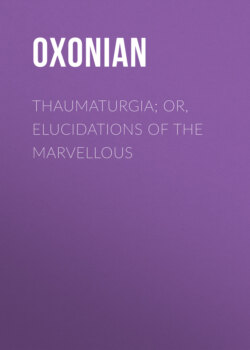Читать книгу Thaumaturgia; Or, Elucidations of the Marvellous - Oxonian - Страница 29
На сайте Литреса книга снята с продажи.
FOOTNOTES:
Оглавление[2] Antonio de Haen, S.C.R.A. Majestate a consiliis anticis, et Archiatri, medicinae in alma et antiquissimo universitate professoris primarij, plurium eruditorium societatem socii, de magia liber. 8vo. Vienna.
[3] Many significations have been attached to the word miracle, both by the ancients and moderns. With us a miracle is the suspension or violation of the laws of nature; and a miracle, which can be explained upon physical principles, ceases to be such. Whatever surpassed their comprehension was regarded by the ancients as a miracle, and every extraordinary degree of information attained by an individual, as well as any unlooked-for occurrence, was referred to some peculiar interposition of the deity. Hence among the ancients, the followers of different divinities, far from denying the miracles performed by their opponents, admitted their reality, but endeavoured to surpass them; and thus in the "life of Zoroaster," we find that able innovator frequently entering the lists with hostile enchanters, admitting but exceeding the wonderful works they performed; and thus also when the thirst of power, or of distinction, divided the sacerdotal colleges, similar trials of skill would ensue, the successful combatant being considered to derive his knowledge from the more powerful god. That the science on which each party depended was derived from experimental physics, may be proved. 1. by the conduct of the Thaumaturgists, or wonder-workers: 2. from what they themselves had said concerning magic; the genii invoked by the magicians, sometimes denoting physical or chemical agents employed, sometimes men who cultivated the science.
[4] All the three orders of Magi enumerated by Porphyry, abstained from wine and women, and the first of these orders from animal food.
[5] Vol. ii. p. 287.
[6] See Tobit. chap. viii. v. 2 and 2.
[7] Elias, as quoted by Becker.
[8] There is no mention made of the word Devil in the Old Testament, but only of Satan: nor do we meet with it in any of the heathen authors who say anything about the devil in the signification attached to it among christians; that is, as a creature revolted from God. Their theology went no farther than to evil genii, or demons, who harassed and persecuted mankind, though we are still aware that many curious nick-names are given to the prince of darkness both by ancient and modern writers.
